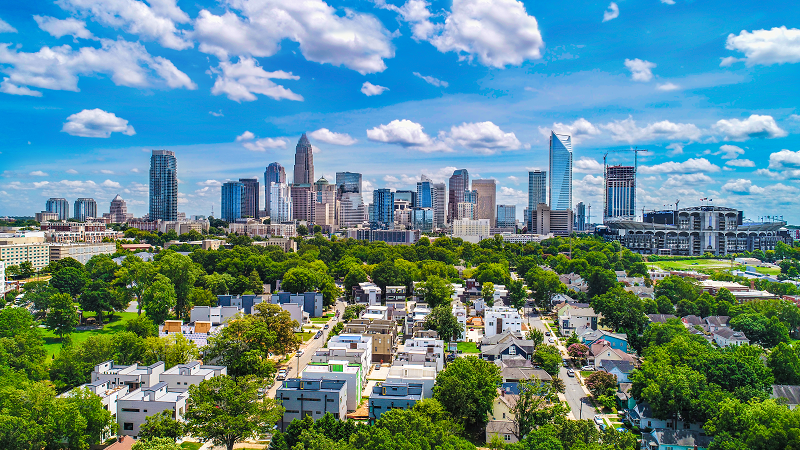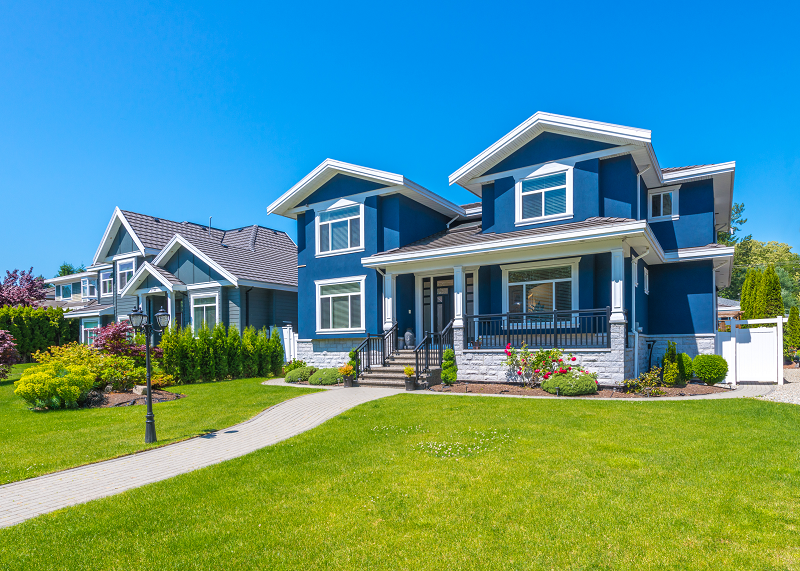
The housing market in the Charlotte area is one of the fastest-growing real estate markets throughout the country. If you are looking to buy or sell property in Charlotte, North Carolina, you will need to learn about typical home values, interest rates, and general Charlotte housing market trends.
The Charlotte real estate market has to keep up with the growing population numbers in the city and the many job openings available over the last year. Home prices are rising, and demand is high within the Charlotte real estate market. To learn more about Charlotte’s housing market trends and how they will impact homes for sale, keep reading the review below.
Average Days on Sale Trends
As of May 2022, the average home spends 13 days on the market in Charlotte. In May 2021, the average number of days a home sold was 17. That shows the average days on sale decreased by four days within the last year.
Over the last year, the number of days on the market until a home gets sold dropped by 23.5 percent. The inventory of homes available in the city equals 0.7 months of supply, which indicates a strong seller’s market.
The median sale price of homes reached $405,000 in Charlotte, which was a 22 percent rise year-over-year as of May 2022. The average home sale price reached $475,778. That was a 17.2 percent growth year-over-year.
In general, home prices are expected to grow by 5.6 percent in 2022 within the Charlotte region. Housing inventory is predicted to rise by as much as 9.9 percent over 2022.
RedFin reports that, as of July 2022, homes in Charlotte sold after 24 days on the housing market on average as compared to 32 days in July 2021. The average days on sale also depend on the particular month a seller completes a home sale.
Houses tend to get sold faster during the spring and early summer. The best time to put your house on the market is in May or late spring. Families seek to move before a new school year starts for their children. The fall and winter tend to be the worst times to sell a home. You can expect homes during these periods to have more days spent on the housing market.
Furthermore, Charlotte’s median listing price increased by 14.1 percent over the past year to $394,000. In July 2022, 1,234 homes were sold. That is a decrease from 1,596 houses in July 2021. Nonetheless, homeowners sold houses in Charlotte in 2022 faster than in prior years.
Property By Type Trends

New home sales in Charlotte metro areas depend on population growth, affordability, and more. According to the Zillow Home Value Index, Charlotte homes cost an average of $396,619 as of May 2022. Home values in Charlotte rose by 30.4 percent over the last year.
In particular, trends for apartments and rental properties have increased in Charlotte over recent years. Younger individuals and those with a lower household income have more trouble affording the rising home prices, which leaves these residents as renters in Charlotte.
In general, the rising population numbers and professional or high-tech jobs have led real estate investors and developers to buy up properties as rental opportunities.
In the Charlotte metro area, the fastest growing rent took place in Rock Hill where it increased by 22 percent in one year. Furthermore, Rock Hill experienced the fastest growing rent of 5.2 percent in the last month.
Charlotte saw rent rise 15.3 percent in one year while Gastonia’s rent prices grew by 14.8 percent.
In Charlotte, you will find a variety of different properties trending in the housing market. New listings may include:
- Modern homes
- High rise condominiums
- Bungalows
- Townhomes
- Lake homes
- Historic homes and mansions
You will also find that the commercial real estate market in Charlotte is growing strong. Commercial real estate is expected to continue rising in 2022. However, growing inflation, supply chain disturbances, and labor shortages may lead to problems for the real estate market, as mortgage rates have started to increase.
Areas of Growth for Property Owners
Four key factors push forward growth in the real estate market both in North Carolina and worldwide. The factors include:
- The demographics of a population
- The economy
- Government subsidies and regulations
- Interest rates
All these factors impact the asking price of the median home in Charlotte. You will need to consider the demographics of homebuyers before putting your home on the market and advertising it with the help of a realtor. That includes considering the age, gender, income, and population growth in an area.
Over the last decade, the population in Charlotte has grown by 19.6 percent and it has the 23rd largest metro area in the country.
The economy and job market are also looking bright in Charlotte with businesses spending $2.2 billion in capital investment as of 2022. Projections show that 300,000 new jobs will get added in Charlotte through 2028.
The federal government also impacts the real estate market whether you reside in Charlotte, Raleigh, Phoenix, or Austin. Essentially, deductions, tax credits, and subsidies can impact demand for real estate property in cities all over the United States.
The changes in interest rates also drive the affordability of real estate worldwide. Low-interest rates allow for more homebuyers to enter the market while high mortgage rates make it more difficult for buyers to purchase a property.
Essentially, the growing population numbers, the strong economy, and government subsidies are all areas of growth for the real estate market in Charlotte.
Areas of Decline for Property Owners
Property owners looking to get into the real estate game in North Carolina may see certain declining trends. For instance, inventory for homes dropped by 24.8 percent year-over-year to only 988 houses for sale.
The number of homes available for sale will continue to impact the real estate market of Charlotte one way or another. With a lower inventory, demand will remain high. However, once property owners sell their homes, they will likely see more trouble purchasing a new house.
Low inventory remains a problem for homebuyers, as they cannot find many options and often have to lose out during bidding wars.
In addition, changes in interest rates also impact the real estate market and may indicate an area of decline for homeowners. Rising interest rates have impacted the housing market in Charlotte. Homebuyers are starting to see problems with affording the expensive homes in the region, as the typical housing prices reach above $400,000 in the city.
Interest rates have reached around six percent, which has even led some homes in Charlotte to start selling below the asking price. For example, the median home listing price of $430,000 led to sales at a final price of $425,000.
Furthermore, more houses are sitting on the market longer. The average number of days homes sat on the market was 24 days in July 2022. As the summer wore on this year, home sales took nearly a month to complete while it took less than two weeks in the spring.
Essentially, the future of the Charlotte housing market may move in the direction of becoming a buyer’s market by the end of the year due to rising interest rates. Fewer buyers and less demand will lead to a buyer’s market.
Real Estate Market Value Growth in Charlotte
The median values of homes in Charlotte, North Carolina have increased to more than $410,000. Furthermore, the median home value has grown by 25 percent in the past year. During the same period, the rest of the country saw real estate value increase by 19.3 percent. As such, the Charlotte real estate market reached further than the nation as a whole.
The global real estate market is also skyrocketing with the global housing market projected to reach $5.85 trillion by 2030, according to a ResearchAndMarkets.com report. That amounts to a CAGR of 5.2 percent through 2030.
The most expensive home sales in NC come from cities like:
- Biltmore Forest
- Wrightsville Beach
- Bald Head Island
- Marvin
- Topsail Beach
In Biltmore Forest, you can expect the typical home price to reach $1,525,769 while home prices in Wrightsville Beach hit $1,506,464. Bald Head Island and Marvin also have listing prices above $1 million. At Topsail Beach, you can buy a home for $974,506 on average.
Conclusion
The Charlotte housing market trends depend on numerous factors like demographics and population numbers, the economy, interest rates, and more. Currently, homes are taking longer to sell as interest rates begin rising. The future of the Charlotte housing market may trend toward a buyer’s market.
If you want to sell a house fast in North Carolina, you may benefit from working with cash buyers and real estate investors. Cash home buyers in Charlotte can complete the sale transaction faster since they do not require a mortgage loan approval.
We buy houses Concord locals love, so contact us today!
